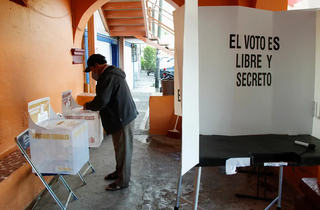Security concerns dominated voter sentiment, ranging from the influence of powerful drug cartels to everyday street crime.
The election pits two leading female candidates against each other: a former academic who aims to continue the populist policies of outgoing President Andrés Manuel López Obrador, and an ex-senator and tech entrepreneur who vows to intensify the fight against the drug cartels. A third, male candidate from a smaller party has targeted the youth vote.
Turnout appeared high, with voters queuing early despite a persistent heat wave. Security and violence were top concerns for many as they cast their ballots.
Nearly 100 million people are registered to vote in this significant election, which also includes races for governors in nine of the country’s 32 states, both houses of Congress, thousands of mayoral positions, and other local posts. These elections are the largest in the nation’s history and have been marred by violence.
This election is seen as a referendum on López Obrador's presidency. Despite expanding social programs, López Obrador has struggled to curb cartel violence. His Morena party holds 23 of the 32 governorships and a simple majority in both houses of Congress. Mexico's constitution prevents presidential reelection.
This election marks a pivotal moment in Mexico's history, not only because it is poised to elect its first female president, but also because it reflects the country's deep-seated issues and the public's desire for change. The two leading candidates represent starkly different approaches to Mexico's challenges: continuity versus a more aggressive stance against the cartels.
The high voter turnout, despite the heat wave and threats of violence, underscores the urgency with which Mexicans view this election. It is a clear indication that the electorate is engaged and eager for solutions to the pervasive violence and insecurity that have plagued the nation for years.
Furthermore, the significant participation in the largest elections in Mexico’s history illustrates the democratic resilience of the Mexican people. Despite the intimidation tactics and violence that have marred the electoral process, citizens are exercising their right to vote, demonstrating their commitment to shaping the future of their country.
As Mexico stands on the brink of potentially transformative leadership, the international community will be watching closely. The new president will not only have to address domestic issues but also navigate complex international relations, particularly with the United States, regarding security, immigration, and trade.
The outcome of this election could signal a new direction for Mexico, one that either reinforces the current administration's policies or embarks on a new path with a stronger emphasis on combating drug-related violence. Either way, this historic vote is a testament to the enduring spirit of democracy in Mexico. (ILKHA)



 Dünya
Dünya
 Spor
Spor
 Spor
Spor
 Dünya
Dünya
 Güncel
Güncel
 Güncel
Güncel
 Dünya
Dünya
 Dünya
Dünya
 Dünya
Dünya
 Dünya
Dünya





